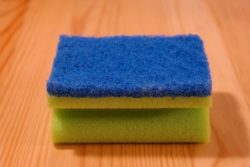Kitchen sponges are essential items in your kitchen as they aid every form of cleaning at any given time. We rely on them when wiping tables, counters, cabinets, fridges and most importantly dishes. It is, therefore, probable that the kitchen sponge is likely to absorb and accumulate massive bacteria. The micro-crevices is a structure that makes the kitchen sponge effective, but it is also a habitable environment for germs and bacteria.
Accumulated germs and bacteria can ultimately lead to food poisoning. Experts have noted tha t a single bacteria cell can multiply to over 8 million bacteria cells within a day. This is a very alarming statistic considering the fact that food we consume is exposed to such amounts of bacteria. It is, therefore, vital to understand the need of keeping the kitchen sponge clean and hygienic at all times. Sponge Club membership recommends the following ways in which you can keep your kitchen sponge clean at all times.
t a single bacteria cell can multiply to over 8 million bacteria cells within a day. This is a very alarming statistic considering the fact that food we consume is exposed to such amounts of bacteria. It is, therefore, vital to understand the need of keeping the kitchen sponge clean and hygienic at all times. Sponge Club membership recommends the following ways in which you can keep your kitchen sponge clean at all times.
Clean the sponges regularly
You should be prompt in ensuring that the kitchen sponge is washed and sanitized daily. The sponge is used to clean various areas that are plagued with harmful bacteria. Therefore you should endeavor to disinfect the sponge any time you get the chance. Cleaning can be done through several ways including microwaving damp sponges for around 60 seconds. Also, you can opt to soak the sponges in hot water mixed with a suitable disinfectant.
Frequent replacement
As it can be noted, kitchen sponges are not costly. It is a cheap component that plays a huge role in your home. You should, therefore, be able to replace ragged and frequently used sponges with new ones at minimal cost and expenditure. Replacement is encouraged because kitchen sponges easily trap bacteria. In order to curb consequent food poisoning frequent replacement is highly recommended.
Store in dry places
As a forementioned, kitchen sponges are made up of micro-crevices which not only trap bacteria easily but also store them for a lengthy period. It is thereby recommended that when you are done using a kitchen sponge, then you should leave it to dry completely. Bacteria flourish in damp places and in this regard you should never store your sponge in enclosed places like containers or buckets.
forementioned, kitchen sponges are made up of micro-crevices which not only trap bacteria easily but also store them for a lengthy period. It is thereby recommended that when you are done using a kitchen sponge, then you should leave it to dry completely. Bacteria flourish in damp places and in this regard you should never store your sponge in enclosed places like containers or buckets.
Avoid sugar and soup
Foodborne pathogens are easily trapped in kitchen sponges. When wiping such, you should employ the use of towels or disinfectant wipes. Generally, usage should be cautious so as to avoid accumulation of harmful bacteria.

